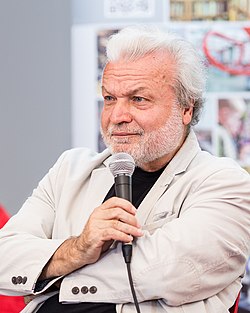Nedim Gürsel

Nedim Gürsel (born 5 April 1951 in Gaziantep) is a Turkish writer. In the late 1960s, he published novellas and essays in Turkish magazines. After graduating from Galatasaray High School in 1970, he studied at the Sorbonne. In 1974, he graduated from the Sorbonne's Department of Modern French Literature.[1] In 1979, he received his doctorate in comparative literature after completing his dissertation on Louis Aragon and Nazim Hikmet.[2] He returned to Turkey, but the unrest there in 1980 persuaded him to go back to France.
In 1976, Gürsel published A Summer without End, a collection of stories. For that collection, in 1977, Gürsel received Turkey's highest literary prize, the Prize of the Turkish Language Academy. After the 1980 Turkish coup d'état, a military tribunal charged that Gürsel's collection had slandered the Turkish army. In 1983, the Turkish military censored Gürsel's novel The First Woman. Although the Turkish authorities dismissed the charges against Gürsel, their actions made A Summer without End and The First Woman unavailable in Turkey for several years.[2]
In 2008, Gürsel published The Daughters of Allah. The book prompted the Turkish authorities to charge Gürsel with insulting religion.[3] In June 2009, a court in Istanbul acquitted Gürsel of the charge.[4]
Gürsel is a founding member of the International Parliament of Writers.[2] In 2019, he was the eleventh Friedrich Dürrenmatt Guest Professor for World Literature[5] at the University of Bern. Today, a citizen of France, he teaches contemporary Turkish literature at the Sorbonne, and works as the research director on Turkish Literature at the International French Science Research Center (CNRS).[1]
Gürsel's awards include:
- 1977, Prize of the Turkish Language Academy
- 1986, the Abdi Ipekçi Prix for his contribution to the bringing together of Greeks and Turks)
- 1986, the Freedom Award by French PEN Club
- 1987, Haldun Taner Citation (with Tomris Uyar and Murathan Munhan)
- 1990, The prize for best international scenario by Radio France Internationale
- 1992, Struga Gold Plaque Award
- 2004, France-Turquie Literary Prize “Fernand Rouillon”
- 2004, Art and Literature Chivalry by French Government.[1]
Gürsel's works include:
- Kadinlar Kitabi (The Book of Women), 1975
- Uzun Sürmüs Bir Yaz (A Summer without End), 1976
- Ilk Kadin (The First Woman), 1986 and 2004
- Sevgilim Istanbul (Istanbul My Love), 1986
- Son Tramvay (The Last Tram), 1991
- Saint Nazaire Günlügü (The Newspaper of Saint-Nazaire), 1995
- Bogazkesen, Fatih’in Romani (The Conqueror), 1996
- Balkanlara Dönüs (Return to the Balkans), 1995
- Nâzim Hikmet ve Geleneksel Türk Yazisi (Nazim Hikmet and Turkish popular literature), 2000
- Yasar Kemal (Yachar Kemal—the novel of a transition), 2000 and 2005
- Aragon: Baskaldiridan Gerçege (The Perpetual Motion of Aragon—dadaïst revolt with the real world), 2000
- Sag Saglim Kavussak, Çocukluk Yillari (In the country of captive fish—a Turkish childhood), 2004
- Allah'in Kizlari (The Daughters of Allah), 2008.[1]
References[edit]
- ^ a b c d Nedim Gürsel Archived 2011-07-18 at the Wayback Machine. Retrieved 2009-05-28.
- ^ a b c "Lettre Ulysses Award | Nedim Gürsel, Turkey". www.lettre-ulysses-award.org. Retrieved 28 May 2009.
- ^ Grove, Thomas (5 June 2009). "Turkish author on trial questions country's freedom of expression". The Daily Star. Retrieved 21 July 2009.
- ^ Lea, Richard (26 June 2009). "Turkish novelist cleared of inciting religious hatred". London: guardian.co.uk. Archived from the original on 23 December 2012. Retrieved 20 July 2009.
- ^ "Nedim Gürsel". Walter Benjamin Kolleg. 12 February 2019. Retrieved 3 August 2020.
